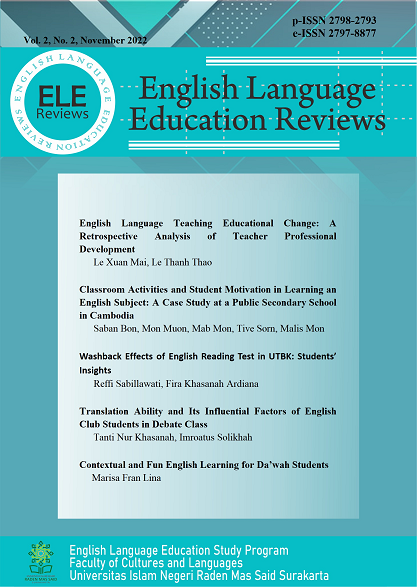Contextual and Fun English Learning for Da’wah Students
DOI:
https://doi.org/10.22515/elereviews.v2i2.5602Keywords:
da’wah management students, English learning, preachersAbstract
Da’wah Faculty students who become the focus of this study are students majoring in Da’wah Management (DM) who, in the future, will become preachers. It makes them sometimes overlook the benefits of learning English. Learning English will be very important for those who will become important actors in spreading Islamic religion to local and international communities. This research aims to explore contextual and fun English learning for students at Da’wah Faculty at an Islamic University in Indonesia. It explores relevant previous studies and important theories and compares them with this study’s findings. This study employed a descriptive-qualitative approach. The results indicated that DM students studied English according to the context of their knowledge as DM students; and that they studied English in fun ways which could encourage them to be more active in joining the class. These findings help English lecturers to create better learning activities to teach DM students. Meanwhile, further researchers can elaborate more toward the research subjects, so the results will be more varied.
Downloads
References
Camargo, V. N. I., & Lacer, B. (2001). The fun approach to English learning. Profile: Issues in Teachers’ Professional Development, 2(1), 9-11.
Chairawati, F. (2014). Evaluasi pembelajaran pada kelas internasional Fakultas Dakwah IAIN Ar-Raniry. Jurnal Al Bayan, 20(1), 15-32. https://doi.org/10.22373/albayan.v20i29.113
Efrizal, D. (2012). Improving students’ speaking through communicative language teaching method at Mts Ja-alhaq, Sentot Ali Basa Islamic Boarding School of Bengkulu, Indonesia. International Journal of Humanities and Social Science, 2(20), 127-134.
Emiliasari, R. N., & Kosmajadi, E. (2019). Persepsi mahasiswa terhadap pembelajaran bahasa Inggris. JURNAL MADINASIKA Manajemen Pendidikan dan Keguruan, 1(1), 35-42.
Fitriyah, L. (2021). The language style of Dr. Zakir Naik’s speech (A pragmastylistic study of speech acts. Discovery, 6(1), 44-52.
Ghonivita, Y., Pahamzah, J., & Wijayanti, A.M. (2021). Improving students’ listening skills and vocabulary mastery through contextual teaching and learning by using online learning. Journal of English Language Teaching and Cultural Studies, 4(1), 10-21. https://doi.org/10.48181/jelts.v4i1.10557
Juriana, J. (2018). Pentingnya penggunaan bahasa Inggris dalam komunikasi dakwah pada era global. Mawa’izh: Jurnal Dakwah dan Pengembangan Sosial Kemanusiaan, 8(2), 241-258. https://doi.org/10.32923/maw.v8i2.773
Khasanah, L. U. (2021). Penelitian kualitatif: Teknik analisis data deskriptif. https://www.dqlab.id//penelitian-kualitatif-teknik-analisis-data-deskriptif
Khotimah, H. (2020). Internalisasi moderasi beragama dalam kurikulum pesantren. Rabbani: Jurnal Pendidikan Agama Islam, 1(1), 62. https://doi.org/10.19105/rjpai.v1i1.3008
Kumar, N., & Umland, G. (2019). Tell your uniqueness. In Activity Playbook English Teachers Conference. SMA Negeri 1 Gresik and SMA NU 1 Gresik.
Lina, M. F. (2021). Maximizing whatsapp group for students group presentation in learning English online. INSANIA: Jurnal Pemikiran Alternatif Kependidikan, 26(2), 175-190. https://doi.org/10.24090/insania.v26i2.5237
Maksum, A. (2016). Model pendidikan toleransi di pesantren modern dan salaf. Jurnal Pendidikan Agama Islam, 3(1), 81-108. https://doi.org/10.15642/jpai.2015.3.1.81-108
Manabe, K., Hwang, W.-Y., & Chuang, Y.-W. (2021). English learning enhanced by collaborative contextual drama in an authentic context. Interactive Learning Environments, 1-17. https://doi.org/10.1080/10494820.2021.1972321
Marinov, R., & Stockemer, D. (2020). The spread of anti‐Islamic sentiment: A comparison between the United States and western Europe. Politics & Policy, 48(3), 402-441. https://doi.org/10.1111/polp.12354
Megawati, F. (2016). Kesulitan mahasiswa dalam mencapai pembelajaran bahasa Inggris secara efektif. Pedagogia: Jurnal Pendidikan, 5(2), 147-156. https://doi.org/10.21070/pedagogia.v5i2.246
Rao, P. S. (2019). The importance of English in the modern era. Asian Journal of Multidimensional Research (AJMR), 8(1), 7. https://doi.org/10.5958/2278-4853.2019.00001.6
Rosyada, A., & Ramadhianti, A. (2021). Implementasi pembelajaran English-speaking pada pondok pesantren tradisional Al Mustaqim: Tantangan untuk dakwah global. E-Dimas: Jurnal Pengabdian Kepada Masyarakat, 12(3), 428-437. https://doi.org/10.26877/e-dimas.v12i3.6533
Setiawan, I. (2009). Respon mahasiswa UIN Jakarta terhadap penggunaan bahasa Arab dan Inggris dalam khutbah Jum’at di Masjid Student Center UIN Jakarta [Undergraduate Thesis]. UIN Syarif Hidayatullah. https://repository.uinjkt.ac.id/dspace/bitstream/123456789/8238/1/IWAN%20SETIAWAN-FDK.pdf
Wardah, W. (2016). Pembelajaran bahasa Inggris di perguruan tinggi Islam dalam konteks esp (English for spesific purpose). Al-Hikmah, 10(2). https://doi.org/10.24260/al-hikmah.v10i2.618
Wijdan, A. (2007). Pemikiran & peradaban Islam. Safiria Insania Press.
Winarsih, W. (2021). Improving learning motivation with fun learning methods in the covid-19 pandemic. Social, Humanities, and Educational Studies (SHES): Conference Series, 4. https://doi.org/10.20961/shes.v4i5.65998
Yusof, S. H., Hassan, F., Hassan, M. S., & Osman, M. N. (2013). The framing of international media on Islam and terrorism. European Scientific Journal, 9(8), 104-121.
Downloads
Published
How to Cite
Issue
Section
Citation Check
License
Copyright (c) 2022 Marisa Fran Lina

This work is licensed under a Creative Commons Attribution-NonCommercial 4.0 International License.
Authors retain copyright and grant the journal right of first publication with the work simultaneously licensed under a Creative Commons Attribution License that allows others to share the work with an acknowledgement of the work's authorship and initial publication in this journal.
This ejournal system and its contents are licensed under
a Creative Commons Attribution-NonCommercial 4.0 International License







